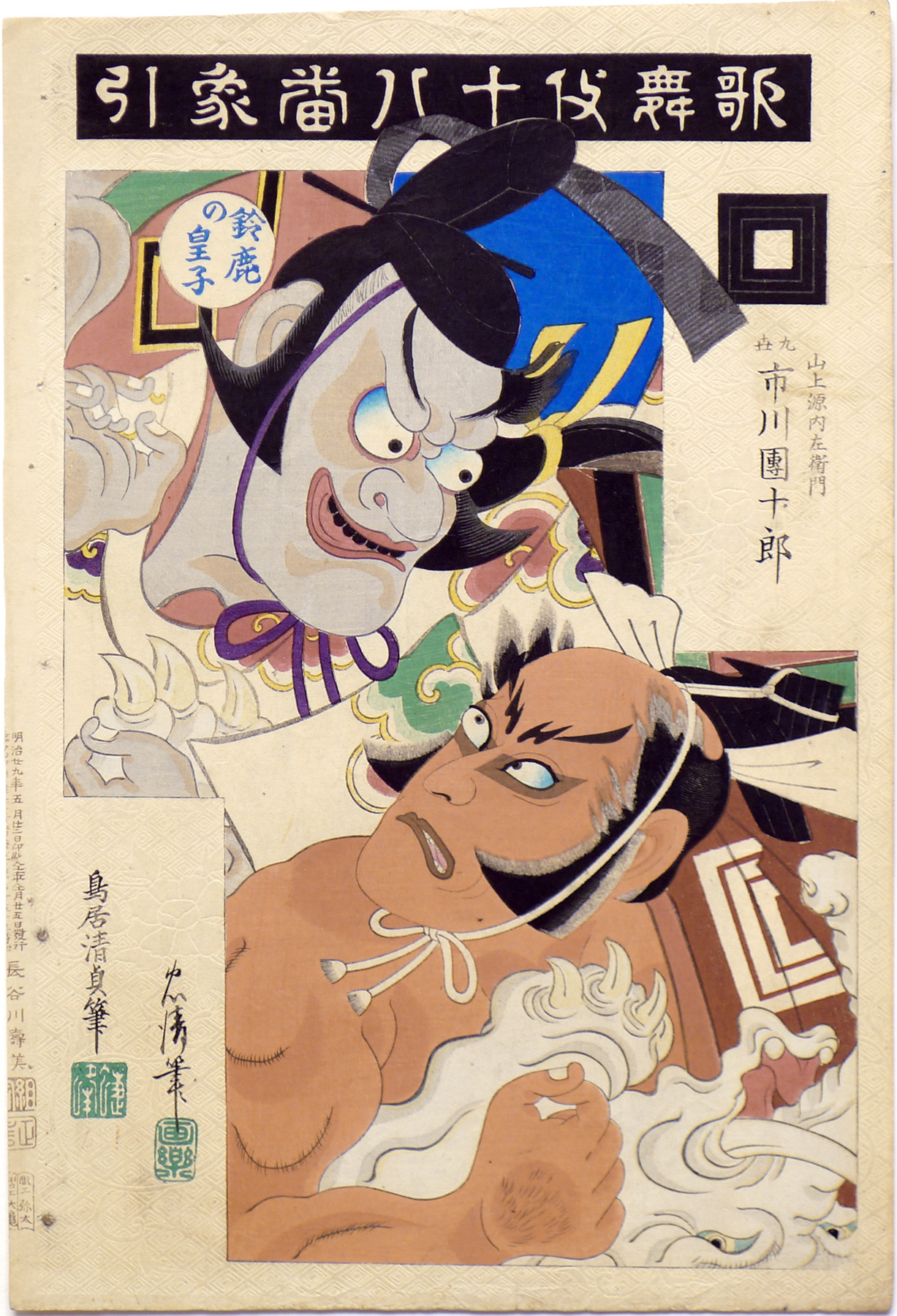About This Print
Ichikawa Danjūrō IX, in the bottom right panel, playing the role of Yamanoue Gennaizaemon 山上源内左衛門 in the kabuki play Zōhiki 象引 (Pulling the Elephant). Pictured is a tug-of-war between Soga no Iruka (played by an unidentified actor) and Gennaizaemon, who are using an elephant instead of a rope. The Ichikawa family crest (mon) of nested squares is shown to the left of Danjūrō, beneath which appears 九世市川団十郎 (9th Generation, Ichikawa Danjūrō) and the character played 山上源内左衛門 (Yamanoue Gennaizaemon.)The Play Zohiki
Source: Kabuki Eighteen Traditional Dramas, Kawatake Toshio, Chronicle Books, 1885, p. 55 and as footnoted."This spectacular piece was first presented by Danjūrō I in 1701 at the Nakamura-za in Edo.1 After it was included in the Kabuki Eighteen it had not been performed for a long time until taken up again by Ichikawa Sadanji II in 1913 and Ichikawa Sanshō in 1933.
Like the two elephants which were carved in relief at the Tōshōgū Shrine in Nikkō long before elephants were brought to Japan, the idea of introducing an elephant on the stage must have caused a sensation. Soga no Iurka and Gennaizaemon get involved in this feat, with Gennaizaemon winning the outcome."
The elephant pulling scene comes at "the climatic point...when the chief male characters pose dramatically as they attempt to pull an elephant apart (the prop for the elephant is about five feet from tail to trunk and looks like an overstuffed toy.)"2
The Kabuki Eighteen
Source: Kabuki Encyclopedia, An English-Language Adaption of Kabuki Jiten, Samuel L. Leiter, Greenwood Press, 1979, p. 152."The Kabuki Eighteen," a collection of plays established by Ichikawa Danjūrō VII, stresses the special aragoto acting art of the Danjūrō line. In the Meiji period other acting families began to gather their most successful plays into similar collections. See the Title Page from the series The Kabuki Eighteen (Kabuki Juhachiban) for a list of the plays.
1 The play was performed as part of the drama Keisei Osho-kun written in 1701 by Ichikawa Danjūrō I under his pen name Mimasuya Hyōgo.
2 Literature East & West: Journal of the Oriental-Western Literary Relations Group of the Modern Language Association of America, Austin, etc. Jenkins Pub. Co, Volume 17, p. 321.
Print Details
| IHL Catalog | #724 |
| Title or Description | Ichikawa Danjūrō IX as Yamanoue Gennaizaemon in the play Zōhiki 九卋市川団十郎 山上源内左衛門 象引 |
| Series | The Kabuki Eighteen (Kabuki Jūhachiban) 歌舞伎十八番 |
| Artist | Torii Kiyosada (1844-1901) and Torii Kiyotada VII (1875-1941) |
| Signature |  left-most signature: Torii Kiyosada hitsu 鳥居清貞筆 followed by 画楽 Chōhō seal |
| Seal | as shown above: Garaku seal right, beneath signature; 画楽 Chōhō seal left, beneath signature |
| Publication Date | May 25, 1896 (Meiji 29) 明治廿九年五月廿五日 |
| Publisher | 長谷川寿美 Hasegawa Sumi [Marks: seal 25-406 長谷川寿美; publisher ref. 102] |
| Engraver | 彫工弥太 Horikō Yata |
| Printer | 摺工大亀 Surikō Ōkame |
| Impression | excellent |
| Colors | excellent |
| Condition | good - slight trimming on left margin; unbacked, light soiling throughout; album binding holes along left margin |
| Genre | ukiyo-e; yakusha-e |
| Miscellaneous | embossing throughout |
| Format | vertical oban |
| H x W Paper | 14 1/2 x 9 7/8 in. (36.8 x 25.1 cm) |
| Literature | |
| Collections This Print | Museum of Fine Arts, Boston RES.53.18; Tokyo Metropolitan Library 5721-C008-07; Tsubouchi Memorial Theatre Museum of Waseda University 201-0129 and 201-0148 and 201-0172 and 201-0200; National Gallery of Australia NGA 98.50.7, 2015.616, 2015.626; Jordan Schnitzer Museum of Art, University of Oregon MWJ51:T107 |
10/17/2019


